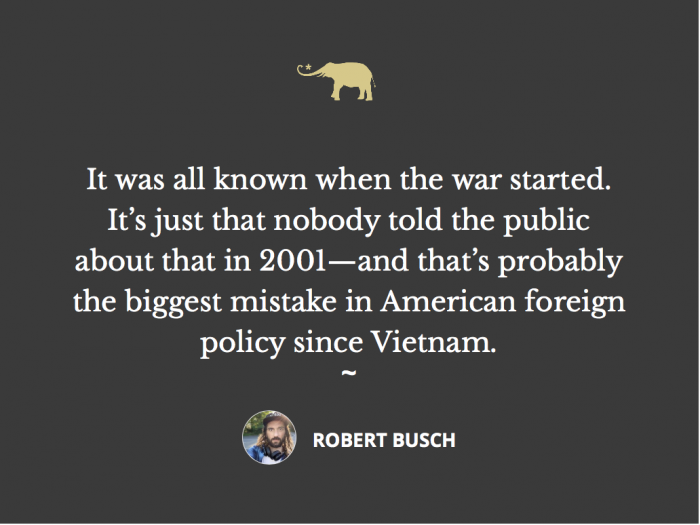Do you remember what you did in October 2001? I was 17 and protested against the war on Afghanistan—and now, 20 years later, I beg the United States not to run away.
But what happened in the meantime that changed my mind?
After 9/11, the world was in a state of shock. The United States wanted to hold the terrorists accountable for their actions and decided to invade Afghanistan. It seemed clear that the Taliban regime had enabled Osama Bin Laden and his followers to organize this tragedy.
Back then, folks like me already questioned the invasion of Afghanistan. First of all, most of the 19 men who flew planes into the World Trade Center and the Pentagon were from Saudi Arabia (an ally of the United States). Some of these terrorists lived in Germany before their vicious attacks on our freedoms.
Nobody ever thought about invading Germany or Saudi Arabia as a consequence of 9/11. The Taliban and Afghanistan became the scapegoat for the worst day in modern American history. And there are good reasons for that too, but the decision to start a war in Afghanistan was still wrong in my opinion.
There was no exit strategy from the beginning. Folks like me and other so-called leftists saw that as the main problem. I was sure that after taking down the Taliban regime, other problems would arise. There were also rumors that the Bush administration actually had other motivations to enter a war in this region of the world.
Most of us remember the “Axis of Evil” speech Bush held back then. He fantasized about all dictatorships in the Middle East falling like dominoes and dreamed of them turning into democracies. I was furious back then. I knew that the concept of bombing countries until they become democracies would not work out.
And I wasn’t alone back then. When I was a teenager, I read several books written by the leading German Middle East expert of that time. He was an ultraconservative old man called Peter Scholl-Latour (he died a few years ago).
Scholl-Latour was an old-school journalist who actually went to the places he wrote about. At the beginning of his career, he was a hostage in Vietnam, later he was on the plane with Ayatollah Khomenei flying to Tehran during the revolution, and during the last years of his life, he still travelled the Middle East to report from the ground.
As mentioned, he was ultraconservative, but I still agreed with his assessments of world politics. He explained in 2001 that a war in Afghanistan would end the same way as the Vietnam war—and he wasn’t the only one.
The Bush administration didn’t listen to any of these voices and portrayed the war in Afghanistan (and later Iraq) as part of an effort to end dictatorships and bring democracy to these countries—I never believed a single word of that.
Now, 20 years later, Joe Biden announced that the goal of the Afghanistan mission was reached because those who attacked the United States on 9/11 had been brought to justice. Republicans already started blaming Biden for the dramatic developments in Afghanistan.
Pompeo: “Pathetic” for Biden to blame Trump for Afghanistan https://t.co/ense311s5Y pic.twitter.com/zRmkiT6KTN
— The Hill (@thehill) August 17, 2021
Democrats attacked Trump and Pompeo for negotiating with the Taliban about the withdrawal of troops. And on top of that, some of the folks Trump set free from prison are now part of the so-called Taliban government.
Former Sec. of State Mike Pompeo says the Biden admin ‘failed’ in its removal of troops from Afghanistan — but he was the one who arranged the deal with the Taliban last February pic.twitter.com/7DTS0OZOwH
— NowThis (@nowthisnews) August 17, 2021
Let’s take a step back and forget about Republicans versus Democrats.
Let’s take a look at public opinion. As Nicole Wallace perfectly put it after Biden’s statements on Afghanistan, “95 percent of the American public will agree with everything he just said, 95 percent of the press covering this White House will disagree.”
MSNBC host @NicolleDWallace: “95% of the American people will agree with everything [President Biden] just said. 95% of the press covering this White House will disagree.” pic.twitter.com/UzLr6DPyPz
— The Recount (@therecount) August 16, 2021
But why is that? Why does public opinion totally go against what journalists and experts think?
Nobody wants to see American soldiers sacrificing their lives in a far-away country—I get that. But only a few still remember how all of this started. When the United States and allies attacked Afghanistan in 2001, it was all about nation building and preventing the country from becoming a breeding ground for international terrorism—at all cost.
Now, 20 years later, public opinion is not willing to pay that price anymore. But that’s exactly what Middle East experts predicted in 2001.
This is not about Republicans or Democrats; this is not about Biden or Trump—this is about the role of the United States in the world.
Running away from Afghanistan comes with a few serious implications. Here are three of them:
1. Setting an example.
The war started with the goal of removing the Taliban from power. For 20 years, the Taliban fought their way back to power.
If this story ends with the Taliban back in power and the United States accepting it, all other dictators around the world will keep that in mind for upcoming conflicts. Everyone who worked for the United States in Afghanistan is now in danger of getting killed by the Taliban.
If we don’t help these people, nobody will ever trust us again.
2. Balance of power in Asia.
China already signaled they would recognize the Taliban as Afghanistan’s government on a friendly base. Russia is already negotiating with Taliban leaders. Pakistan and Iran are not too upset about the United States withdrawing their troops from their backyard.
Leaving this area of the world behind changes the dynamics in international politics forever.
3. Admitting that it was never about human rights.
It is not easy to balance national interest with the responsibility to protect as defined by the United Nations. Since the fall of the Soviet Union, almost every war was started with the goal of protecting human rights. Some of you might have seen the movie “Black Hawk Down,” based on the story of American soldiers getting killed in Somalia during a so-called peacekeeping mission (followed by a withdrawal of troops).
The war in Iraq was met with a lot of criticism from European allies, as it seemed to be more about oil than human rights or removing Saddam Hussein from power. And now, Biden says that protecting the people of Afghanistan is not a national interest of the United States. I would say, “It has never been about that.”
When the United States went to war in Afghanistan, it all seemed reasonable after 9/11. The American public fully supported the idea of retaliation against those who viciously attacked our way of living. But there was never a conversation about how that would play out in the long run.
Public opinion was manipulated into believing that a war would establish democracy and human rights in these areas of the world. It felt like a moral obligation to take the role of the world police as the only remaining superpower.
That mindset was a recipe for disaster. No single nation in the world can successfully be the world police—that’s why we have the United Nations. We need international cooperation to solve international conflicts.
This is not the time for Democrats and Republicans to blame each other; this is the time to rethink the role of the United States in the world.
We need a new mindset of approaching the problems of our time (COVID-19, terrorism, climate change, and human rights).
There are terrible things happening in several countries on this planet, and the United States cannot solve these conflicts alone. And nobody is willing to pay for that. So, let’s stop pretending that we can do it on our own.
Let’s admit past mistakes and seek a new way of international cooperation. Let’s face the reality that the power of the United States in the world is declining—and it’s not the fault of Democrats or Republicans.
This is the result of misleading the American public into believing that we could go to Afghanistan, build a nation, and get out of there without any losses.
There is a reason why the United States is not intervening in the ongoing civil war in Syria. There are good arguments why the United States should not seek conflict with Iran. And there is the danger of China and Russia filling the vacuum left behind by American politics.
I don’t want to live in a world that is dominated by Chinese or Russian national interests. But I also don’t want to live in a world that is policed by a nation that puts its national interest in the first place—you can’t have it all, right?
Afghanistan showed us that we couldn’t force democracy onto nations. And it also taught us that we shouldn’t start a war in the name of human rights without having an exit strategy. Let’s not repeat that mistake ever again.
But we have to take responsibility for the mess we already created. Afghanistan needs our help. We cannot accept a Taliban regime. We cannot allow Afghanistan to turn into another Iran. We cannot allow that our allies and friends in Afghanistan get slaughtered by the Taliban.
If you think you are in a desperate situation, think about them. #Afganisthan pic.twitter.com/8O2c338Q2k
— Faridah Nakazibwe (@fsnakazibwe) August 17, 2021
We should never start a war like this again, but we are responsible for the outcome of a war we already started. Looking the other way or talking about national interest when the going gets tough seems like gaslighting to me.
It was all known when the war started. It’s just that nobody told the public about that in 2001—and that’s probably the biggest mistake in American foreign policy since Vietnam.
 Share on bsky
Share on bsky







Read 9 comments and reply